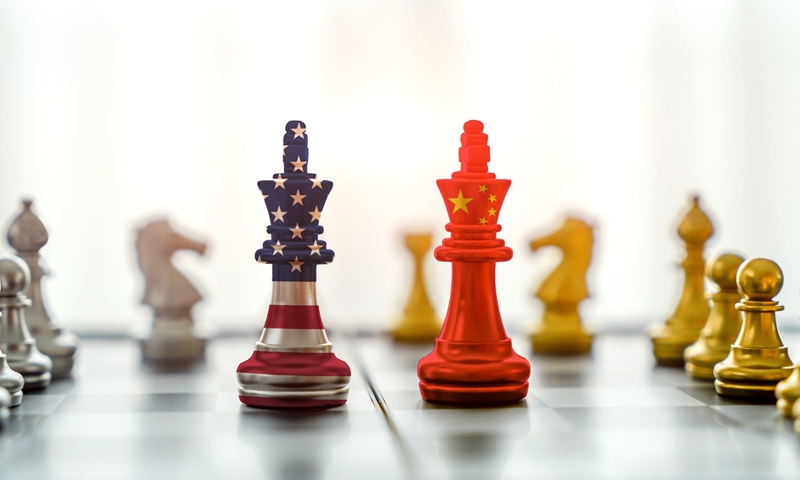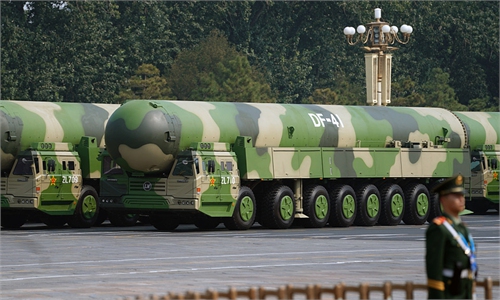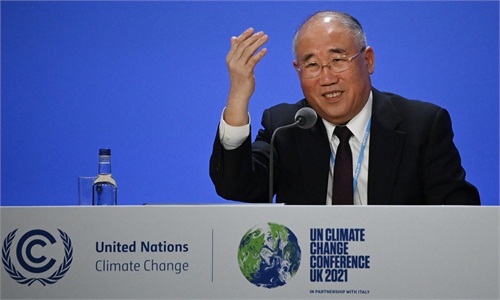China-US climate declaration injects confidence in bilateral cooperation under APEC, possibly more interactions in trade, military
Biden urged to make long-term climate promises

China US Photo:IC
Ahead of Friday's APEC leaders' summit which will see leaders from China and the US at the same virtual stage, the world's two biggest economies broke through their stalemate by reaching a climate action deal at the COP26, which Chinese analysts believe not only injected positive energy to global climate actions and success of COP26, but boosted confidence in future bilateral cooperation within the framework of APEC, and created a good atmosphere for the reported Xi-Biden virtual summit.
Analysts said the US, after hitting the ceiling of its "position of strength" through months of pressure and attacks against China, finally realized the significance of bilateral cooperation. But they also warned that partisan politics and polarization in the US may affect the consistency of US pledges to cooperate, urging the US to be sincere, and keep its political tricks out of the constructive interactions of the two countries.
But they also warned that partisan politics and polarization in the US may affect the consistency of US pledges to cooperate,
Chinese President Xi Jinping will attend the 28th Asia-Pacific Economic Cooperation (APEC) Economic Leaders' Meeting in Beijing by video link on Friday and deliver an important speech along with other world leaders, including US President Joe Biden. On Thursday, Xi attended the APEC CEO Summit through a prerecorded video and delivered a keynote speech, in which he stressed China's pledge to continue opening up and reach carbon neutrality.
Highlighting China's commitment to advance reform and opening-up to add impetus to economic development in the Asia-Pacific, Xi said the country will continue to shorten the negative list on foreign investment, promote all-round opening-up of its agricultural and manufacturing sectors, expand the opening of the service sector, and treat domestic and foreign businesses as equals in accordance with law.
A day before Xi's speech at the APEC CEO Summit, China and the US on Wednesday released the China-US Joint Glasgow Declaration on Enhancing Climate Action in the 2020s, which included setting up a working group and reducing methane and CO2 emissions. The two sides said they appreciated the work done so far and pledged to continue working together and with all parties to strengthen the implementation of the Paris Agreement. On the basis of the principle of common but differentiated responsibilities and respective capabilities, as well as taking into account national conditions, enhanced climate action will be taken to effectively address the climate crisis.
The declaration is the product of candid exchanges, mutual understanding and efforts to expand consensus, which once again showed China and the US can work together on major international issues and accomplish great things that benefit the people of both countries and the world, Wang Wenbin, spokesperson of the Chinese Foreign Ministry, said at Thursday's media briefing.
China is ready to work with the US to deepen dialogue and cooperation on climate change, inject positive energy to the multilateral process and promote a fair, win-win cooperation on the global climate system, Wang said.
Xie Zhenhua, China's Special Envoy for Climate Change, said on the release of the declaration that it once again shows that China-US cooperation is the only right choice, and that China and the US have more consensus than differences on climate change.
Yang Fuqiang, a research fellow at Peking University's Research Institute for Energy, told the Global Times the declaration could play a positive role not only for developed countries but also developing countries, with more cooperation in technologies such as reducing emissions of methane to be expected.
Compared to the serious commitment made by the Chinese government in achieving the targets set by the Paris Agreement, there are many uncertainties in US politics, analysts said. For instance, if a Republican President is elected again, how can the US government guarantee they won't withdraw from the climate change commitment, given there has not been a strong public consensus in the US in support of climate actions compared to that of Europe? Yang noted.
"If the US government deviates from its commitment on climate change one more time, its credibility would be severely damaged," he said.
However, China went steadily in accordance with the guidelines we have set no matter how the US reacted, Lü Xiang, a research fellow at the Chinese Academy of Social Sciences, told the Global Times.
Some Western media said China did not make strong commitments at the COP26 and in the declaration with the US, but Lü said that China is not a bragging country but a down to earth one, and will not act like some Western countries which blindly make promises but don't honor them.
Donald Trump's selfish and irresponsible withdrawal from the Paris agreement has set back global emissions cuts by about five years, and Biden needs to double his commitment to make up for the loss, and the US Congress must pass important measures to make long-term promises, analysts said.
Positive sign?
In some recent occasions, US officials tended to adopt a softer tone regarding China and tried to avoid using rhetoric carrying the connotation of confrontation, as they knew provocative words do nothing good for the US, Lü said.
The latest remarks of US National Security Adviser Jake Sullivan, which claimed that the Biden administration is not seeking a fundamental transformation of the Chinese system in an interview with CNN this week, signaled a softer rhetoric of the Biden administration on bilateral relations.
Analysts said that China and the US may strengthen cooperation in tackling the global pandemic, such as the fair distribution of vaccines to developing countries, as well as developing green and digital economy for global economy recovery at the APEC leaders' summit. The recent positive interactions show what Xi said that "the Pacific Ocean is big enough to accommodate both China and the US."
In explaining the rhetorical change of the US, Ni Feng, deputy director of the Institute of American Studies at the Chinese Academy of Social Sciences, told the Global Times that China and the US have basically entered a phase of strategic balance in which no one can knock off the other, and this may last for quite a long time.
However, some other Chinese analysts said we cannot be too optimistic in the US' positive stance to ease bilateral ties, given the partisan politics and polarization currently in the US.
Six US Republican lawmakers just visited the island of Taiwan via a military aircraft on Tuesday and US Secretary of State Antony Blinken said on Wednesday the US and its allies would take unspecified "action" if China were to use force to alter the status quo over Taiwan island.
Analysts said during the strategic balance period, the US will create space for bilateral cooperation that favors the US, but won't hesitate to create trouble for China and the Taiwan question is the most obvious evidence.
Ni warned that the US has been trying to escalate tensions on the Taiwan question, and the two countries may encounter an "explosive scenario" if they fail to properly control the situation, and the US may also make moves ideologically during the Democracy Summit in December to isolate China.
The US claimed that it deals with China from "the position of strength," and now its position of strength has hit the ceiling. In comparison, China is standing on an equal footing or even higher than the US in terms of a consistent and stable policy towards the US, Lü said.
He said China and the US will embrace frequent interactions in the last two months of 2021 and first quarter of 2022, probably in trade and the military.
"A mutually satisfactory arrangement on bilateral trade is expected during the period, and the two militaries may carry out positive contacts on the South China Sea issue, as unlike the Taiwan question where the US uses military factors mainly for a political stance, military activities in the South China Sea may result in confrontation," Lü said.



